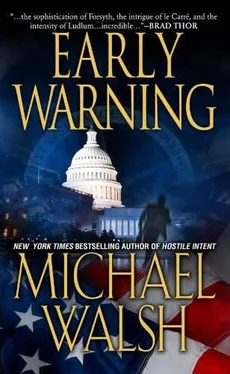Michael Walsh - Early Warning
Здесь есть возможность читать онлайн «Michael Walsh - Early Warning» весь текст электронной книги совершенно бесплатно (целиком полную версию без сокращений). В некоторых случаях можно слушать аудио, скачать через торрент в формате fb2 и присутствует краткое содержание. Жанр: Триллер, на английском языке. Описание произведения, (предисловие) а так же отзывы посетителей доступны на портале библиотеки ЛибКат.
- Название:Early Warning
- Автор:
- Жанр:
- Год:неизвестен
- ISBN:нет данных
- Рейтинг книги:3 / 5. Голосов: 1
-
Избранное:Добавить в избранное
- Отзывы:
-
Ваша оценка:
- 60
- 1
- 2
- 3
- 4
- 5
Early Warning: краткое содержание, описание и аннотация
Предлагаем к чтению аннотацию, описание, краткое содержание или предисловие (зависит от того, что написал сам автор книги «Early Warning»). Если вы не нашли необходимую информацию о книге — напишите в комментариях, мы постараемся отыскать её.
Early Warning — читать онлайн бесплатно полную книгу (весь текст) целиком
Ниже представлен текст книги, разбитый по страницам. Система сохранения места последней прочитанной страницы, позволяет с удобством читать онлайн бесплатно книгу «Early Warning», без необходимости каждый раз заново искать на чём Вы остановились. Поставьте закладку, и сможете в любой момент перейти на страницу, на которой закончили чтение.
Интервал:
Закладка:
He pressed a buzzer on his desk, which connected him immediately to his assistant. In the old days, she would have been called his secretary, but somewhere along the line someone had decided this wasn’t politically correct.
“Ms. Overbay?” he said. “Please ask Major Atwater to come up, please.”
“Right away, Director,” replied Ms. Overbay. If someone put a gun to his head and demanded that he describe Ms. Overbay, he wasn’t sure he could do it. Everything about the modern workplace had become distant, defensive, protective, impersonal. If he could get through the day without interacting with anyone face-to-face, he would, and Seelye suspected that a lot of managers and office workers around the country felt the same way.
It would take Atwater only a few minutes to hustle to the DIRNSA’s office. Seelye let his eyes roam over his desk, which was always kept as tidy as possible. But on this day there were a few items laid out on it, simple enough individually but disturbing when taken as a whole. Someone was trying to send him a message.
Regarding the first, there was no doubt about its provenance. It was a letter, an old-fashioned letter, from Moscow, bearing the unique postal stamp of the Kremlin:
“My dear Seelye,” it began, in English, obviously painstakingly translated in its writer’s head from the original Russian thoughts. And then, just as obviously, not. It read instead as if it had been passed through one of those Web translation programs, which rendered the most elegant original into snarling gibberish. “Long time I am retired but fashion change so I write tell you danger. Illegals program of course you know but what don’t know is that continued long after Soviet Union demise, people in place already, what else to do, nothing. But still election danger. Yours, N-.”
The old Soviet “illegals program” was a long-running attempt to recruit, or insinuate, native-born sleeper agents into the U.S. government at the highest levels. Throughout his career, Seelye had monitored and tracked them, taking them out where he could-that was a real problem, since so many of them had graduated from elite prep schools like Hotchkiss and Choate, or from Harvard and Yale; there really were no traitors like old-money traitors, and the nouveau quota babies who aped them. But this note took the illegals program to a whole new level. Was an “illegal” now running for the highest office in the land?
If the information was true-a big if-then this was a problem that no one in the U.S. government had ever before confronted. For nearly three centuries, it was assumed that both political parties were acting in good faith, that the candidates they offered were Constitutionally eligible, and beholden to no foreign power. But, aside from Article II, Section One, there was no check on eligibility. The people had to take the word of the parties that the candidates they offered up for consideration were, in fact, eligible. It didn’t matter whether the Constitution was “living” or “original,” the language was plain. And from that trust in the system flowed all else, including the military’s tradition of absolute deference to duly constituted civil authority, which most certainly included his own deference to the President of the United States, whoever might be currently occupying the office. Still, he was going to have a run a thorough background check on Angela Hassett-and on Jeb Tyler, for that matter, just to be fair.
That task was certainly much easier today than it ever had been. There was a world of personal information about nearly every man, woman, and child in America available on the Internet and the amazing part was that-through Twitter, Facebook, MySpace, LinkedIn and the other social-networking sites-the American public had made such information freely and publicly available.
Which was why Government 2.0 had been such a success, depending on your point of view, of course. The executive branch didn’t need the NSA or any of the other intelligence agencies to compile their rosters and lists of the voting public, didn’t need spooks and FBI agents going door to door to inquire about people’s loyalty or sexual predilections or political persuasions: the public had already volunteered such information, even if it didn’t yet realize it. The thought of all this information in the wrong hands sometimes kept Seelye awake at night. It was all right if such material stayed relatively safely in the hands of professionals like himself, but now every political hack, twenty-something ideologue, and freelance double agent had access to it. It would, he knew, all end badly. He just hoped and prayed that he wouldn’t be around to see it happen.
The note from the “Russian” was only one of several puzzling things on his desk. Spread out before him were several pieces of paper he had not yet shared with the president or anybody else. They were printouts of a series of anonymous e-mails that had come not through channels but directly to his in-box. His secure e-mail addresses-he had several, depending on the usage-were known to only a handful of staffers both in NSA/CSS and at the White House. They were classified Top Secret. And yet someone had at least one of them.
“Dirnsa Seelye,” began the first one. “What are the Thirty-Nine Steps?”
“Lt. General Armond Seelye or To Whom It May Concern,” ran the second. “Edgar Allan POE. (signed) the Magician.”
The third was a bit more complex: “UG RMK CSXHMUFMKB TOXG CMVATLUIV.” It was unsigned.
The fourth was a series of numbers: 317, 8, 92, 73, 112, 79, 67, 318, 28, 96, 107, 41, 631, 78, 146, 397, 118, 98, 114.
The fifth was a series of 87 characters, squiggles based on the letter “E,” arranged in three rows:

The sixth was the briefest of them all: “Masterman. XX.”
All were, of course, ridiculously easy to recognize, if not to understand. The real question was what, cumulatively, did they mean? Were they a game? A warning? A threat? And did they have anything to do with what was going on in New York? In the wilderness of mirrors, everything was related and nothing was connected.
Seelye spread the printouts on his desk and looked them over. How he longed for the days when written communications were actually written, or at least typed, and the paper could be subjected to various forms of analysis. In the old days, each typewriter had its own distinctive signature, like a fingerprint, and many was the criminal who went to jail, or the spy who was exposed when the papers came out of the pumpkin, or executed when his machine was found and identified. Not anymore. Today almost everything came electronically, even bills and junk mail, and thanks to the infinite permutations of ones and zeroes, anything could be encoded within anything else. Churchill’s famous comment about Russia, that it was a “riddle wrapped in a mystery inside an enigma,” could now properly be applied to everything. Even e-mail.
Well, that was part of the NSA’s brief, too. No Such Agency was founded by President Truman in 1952 to both collect and decode foreign signals (SIGINT) and to protect America ’s codes from hostile code breakers. The Second World War had made both encryption and cryptanalysis boom industries, and a wide variety of codes had been employed, everything from the Germans’ “Enigma” machine-named after the series of musical variations by the British composer, Sir Edward Elgar, to the Navajo “code talkers” who had worked for the Marine Corps in the Pacific theater.
Still, in the end, code-breaking was all about patterns, even if those patterns were sometimes so deeply hidden that they resembled wheels within wheels, whose sprockets had to be carefully aligned for the message to be read and understood. Today, the volume and the magnitude of the threat was infinitely greater than it had been 75 years ago-one missed pattern and the next thing you knew there was a smoking, radioactive crater where midtown Manhattan or the Washington Monument had once stood.
Читать дальшеИнтервал:
Закладка:
Похожие книги на «Early Warning»
Представляем Вашему вниманию похожие книги на «Early Warning» списком для выбора. Мы отобрали схожую по названию и смыслу литературу в надежде предоставить читателям больше вариантов отыскать новые, интересные, ещё непрочитанные произведения.
Обсуждение, отзывы о книге «Early Warning» и просто собственные мнения читателей. Оставьте ваши комментарии, напишите, что Вы думаете о произведении, его смысле или главных героях. Укажите что конкретно понравилось, а что нет, и почему Вы так считаете.












